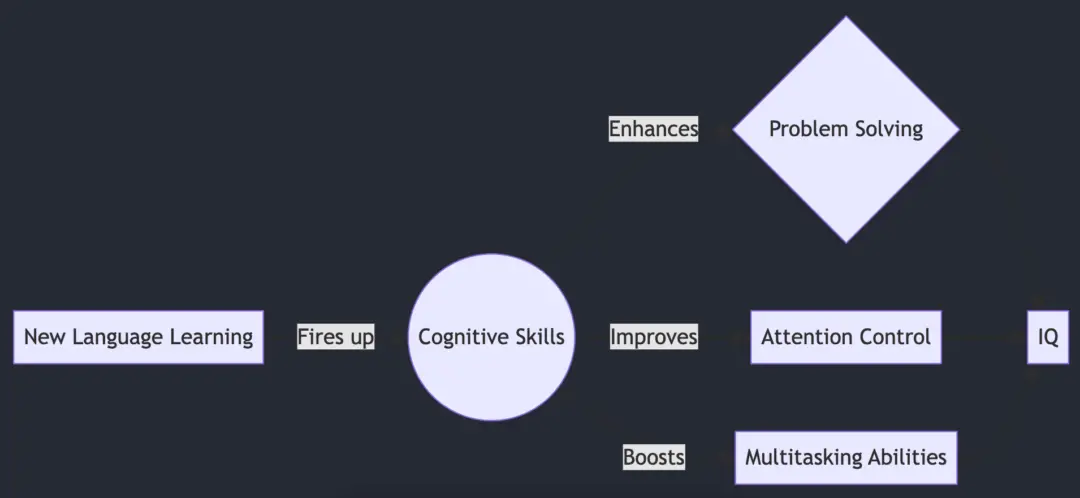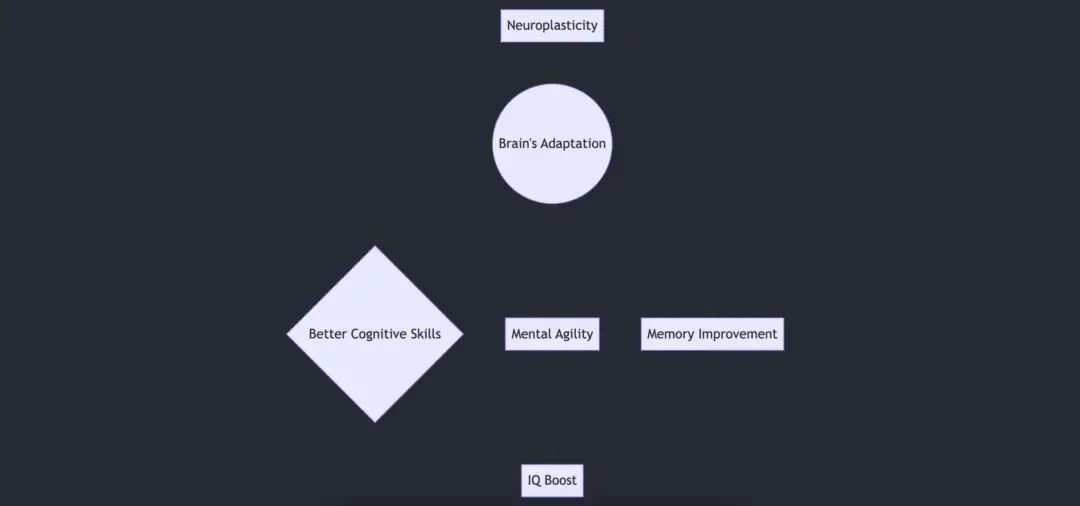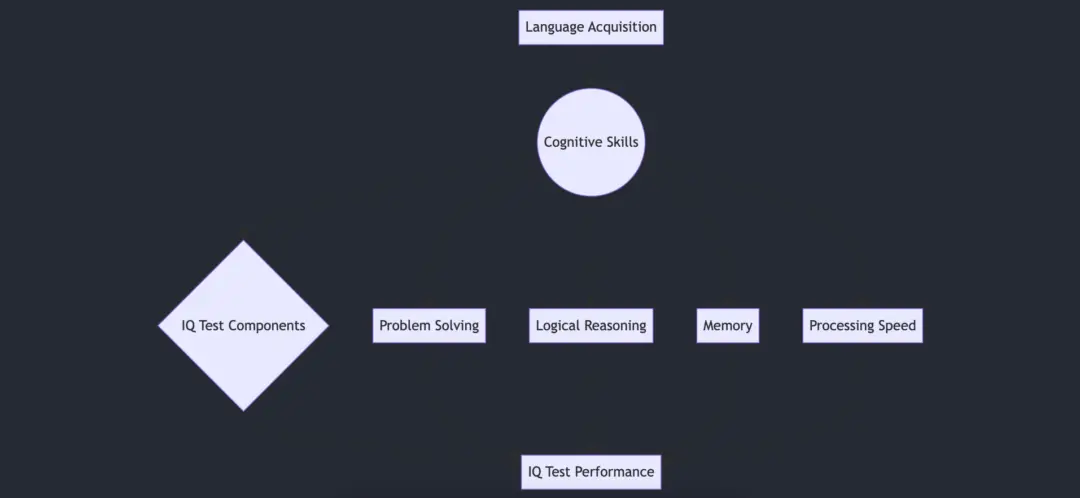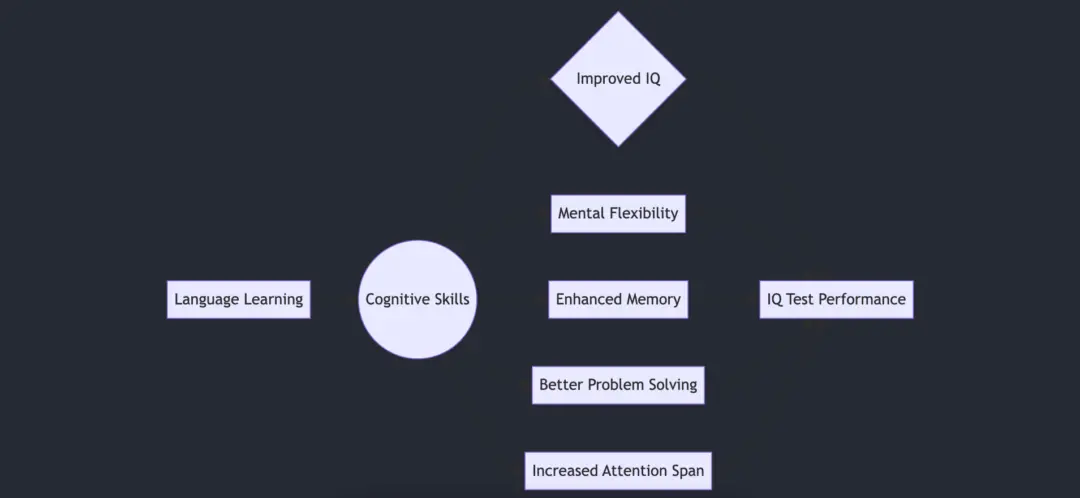Ever found yourself captivated by the allure of learning a new language, but wondered if it could do more than just expand your vocabulary? Does it really have the power to boost your IQ? Rest assured, you’ve landed in the right place. In the coming paragraphs, we’ll delve into this intriguing inquiry, providing comprehensive, well-researched, and insightful knowledge.
In a nutshell, yes, learning a new language does have the potential to indirectly boost your IQ. It stimulates cognitive abilities such as critical thinking, problem-solving, and multitasking, all crucial components of IQ testing.
But don’t click away just yet! There’s a whole lot more to this topic than meets the eye. This fascinating journey of exploring the intertwining threads between language acquisition and intelligence quotient is just beginning. So, stick around as we delve deeper, unraveling the complexities and subtleties of this fascinating cognitive relationship.
The Neuroscience Behind Language Learning and IQ
So, let’s dive into the nitty-gritty, shall we? After all, this isn’t just about becoming a polyglot for the bragging rights. We’re digging deep to understand how the act of language learning can indeed impact the elusive IQ.
The brain is a wonderfully complex organ, and the way it responds to learning a new language is no exception. See, when you take on a new language, it’s like giving your brain a proper workout, flexing and strengthening several cognitive muscles. This involves both the grey and white matter in your brain, areas associated with processing and transmitting information.
Now, I hear you saying, “Okay, but how does this tie to my IQ?” Well, it’s simple, really. You see, IQ isn’t just about how much you know—it’s about how you process, understand, and apply information. That’s where language learning swoops in, exercising parts of the brain involved in these cognitive functions.
Cognitive scientists have found that acquiring a second (or third, or fourth…) language can improve mental agility, a factor that often correlates with higher IQ scores. In essence, learning a new language stimulates your neural networks, enhancing cognitive skills that are reflected in IQ testing.
Cognitive Benefits of Bilingualism: More than Meets the Eye
It’s time to uncover the subtle and not-so-subtle advantages that being bilingual or multilingual can bring. This is not merely about impressive party tricks or making your resume stand out—these benefits penetrate much deeper, into the realm of cognitive prowess and flexibility.
You may be thinking, “Well, how exactly does knowing more languages enhance cognitive abilities?” A fantastic question! To answer this, we need to understand what happens in the brain when you learn a new language.

The brain workout that comes with juggling multiple languages can lead to an array of cognitive advantages. Bilingual individuals often have a knack for solving puzzles faster, switching between tasks more efficiently, and concentrating on a task despite distractions—skills all too crucial in our noisy world.
Now, brace yourself for a jaw-dropping fact: Research has consistently shown that bilinguals outperform their monolingual peers in tasks measuring executive function—a set of mental abilities that includes problem-solving, shifting attention, and multiple tasking.
In a world where distractions are just a screen away, the potential of bilingualism to improve focus and multitasking cannot be overstated. If you’re thinking this smells like a recipe for a higher IQ, you’re spot on! These skills contribute significantly to the scores on an IQ test.
Here’s an illuminating quote from Ellen Bialystok, a renowned cognitive psychologist:
“The constant mental juggling bilinguals do when they communicate is like brain exercise. It may not bulk up muscles, but it certainly keeps the cognitive skills toned and ready.“
So, the next time you hesitate to download that language-learning app, remember the wealth of cognitive benefits you stand to gain. And who knows, it might just give your IQ a little nudge upward! Now, isn’t that a bonus worth striving for?
How Multilingualism Shapes the Brain and Improves IQ
This isn’t merely a chapter in a neuroscience textbook—it’s an exciting journey, traversing the corridors of the brain and observing how multilingualism reshapes its very landscape.
A cornerstone of this journey is understanding neuroplasticity. Now, don’t let the jargon intimidate you! Neuroplasticity simply refers to the brain’s ability to adapt and change as a result of experiences, including learning new languages. As you master more languages, you’re essentially molding your brain, helping it evolve and adapt.

Delving deeper, here’s something fascinating to consider: the brains of multilingual individuals appear to be structurally different from those of monolingual individuals. That’s right! Speaking more than one language can lead to an increase in the size and activity of the brain’s language centers and the connections between them.
If we put this in the context of intelligence and IQ, here’s the key takeaway: as language learning flexes and enhances cognitive abilities like memory, attention, and mental agility—features associated with a higher IQ—it’s also physically transforming your brain to accommodate these improvements.
In the words of Dr. Viorica Marian, a leading scholar in the field of multilingualism and cognition:
“Multilingualism does more than just transform your language abilities—it enhances your cognitive and sensory processing, reshapes your brain networks, and may even protect against aging-related cognitive decline.“
There’s a certain beauty in knowing that each word learned, each grammar rule mastered, each conversation practiced in a new language is subtly yet substantially rewiring your brain and potentially elevating your IQ. So, for those pondering whether learning a new language can boost your IQ, the answer is a resounding yes! As with anything worth pursuing, the process requires commitment and practice—but the payoff, in this case, is undeniably profound.
Decoding the Impact of Language Acquisition on Intelligence Tests
This journey will take us beyond casual observations and dive into how the skills honed through language learning might play out in a formal intelligence testing scenario.
IQ, or intelligence quotient, tests assess a range of cognitive abilities including memory, problem-solving, logical reasoning, and processing speed—many of which we’ve already established can be positively influenced by language learning. So, let’s lay out this narrative in a more visual manner, shall we?

Here’s the lowdown: when you learn a new language, your brain exercises its ability to switch between different structures of syntax, grammar, and vocabulary. This workout hones your cognitive flexibility—your brain’s ability to transition swiftly between tasks or thoughts.
This enhanced cognitive flexibility, coupled with improved attention control and memory, can greatly influence performance on various components of IQ tests, which require fast thinking, quick adaptation to new tasks, and accurate memory recall.
Here’s a valuable insight from Dr. Kenneth Paap, a neuroscientist specializing in the cognitive benefits of bilingualism: “Being bilingual has certain cognitive benefits and boosts the performance in several components of IQ tests. The constant mental exercise of selecting the correct language or switching between two languages enhances executive functions, improving overall cognitive abilities evaluated in an IQ test.“
And it’s not just about performing better on an IQ test. These improvements in cognitive abilities can ripple out to various aspects of life, from academic performance to career success and even personal relationships.
So, as we decode the impact of language acquisition on intelligence tests, we’re not just unearthing a connection between multilingualism and higher IQ scores. We’re highlighting how this intersection of language learning and cognition can weave its influence into the very fabric of your life, enriching it in ways that go beyond the confines of an IQ test.
Unveiling the Subtle Interplay: Language Learning, Cognitive Skills, and IQ
This act isn’t about a simple cause-and-effect relationship—it’s about the elegant dance of variables that weave together to influence our intelligence.
When we embark on the adventure of learning a new language, we often think about the immediate benefits—communicating with a wider array of people, exploring different cultures, enhancing our career prospects. Yet, beneath this surface lie deeper, more intricate effects that are arguably even more transformative.
Here’s an attempt to visually encapsulate this interplay:

As you soak in the rhythms of a new language, your brain learns to dance to a new beat, improving various cognitive skills. Mental flexibility becomes more fluid, memory storage more efficient, problem-solving skills more robust, and attention span longer.
These honed abilities can directly boost your performance on an IQ test. Yet, the magic of this interplay is that it extends far beyond IQ scores. These enhanced cognitive skills can improve your overall intelligence and cognitive abilities, helping you navigate life’s challenges with more agility and resilience.
To quote renowned linguist, Noam Chomsky: “Language is a process of free creation; its laws and principles are fixed, but the manner in which the principles of generation are used is free and infinitely varied. Even the interpretation and use of words involves a process of free creation.“
This encapsulates the crux of our journey. As we navigate the terrain of a new language, we’re not just following the coordinates of grammar rules and vocabulary lists—we’re paving our own path, reshaping our cognitive abilities, and possibly even giving our IQ a gentle push upwards. It’s an intriguing dance of interplay, subtly yet significantly influencing our intelligence and our lives.